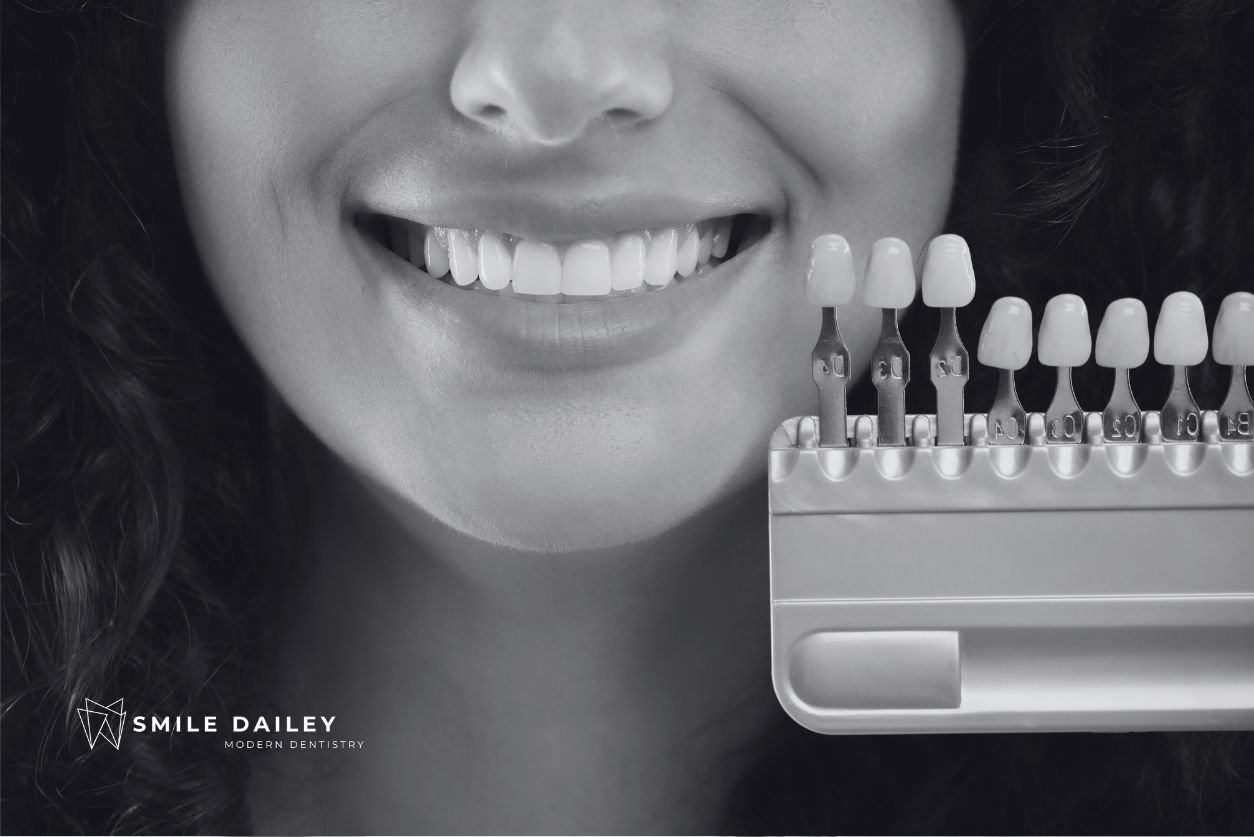Thinking about veneers pros and cons? You're not alone. Smile Dailey Dental frequently discusses with patients how veneers can help achieve brighter, straighter, picture-ready teeth quickly. But are veneers worth it and right for you? All the pros and cons will be explained. You'll learn what veneers can address, the risks to consider, and how they compare to other options. This information will help you decide wisely.
Key Takeaways:
- Veneers fix stained, chipped, gapped, small, or crooked teeth.
- They improve smile appearance and facial balance, often boosting confidence.
- Porcelain veneers last 10–15 years; composite lasts 5–7 years.
- Veneers require enamel removal—this is permanent.
- Common materials: porcelain, composite, Emax, zirconia, Lumineers, and prepless.
- Porcelain looks more natural and resists stains better than composite.
- Costs per tooth: $400–$2,000 (composite), $1,000–$2,500 (porcelain), $800–$2,000 (no-prep).
- Insurance rarely covers veneers; payment options are available.
- Best for adults with healthy teeth; not ideal for teens or teeth with disease.
- Side effects include tooth sensitivity and gum irritation if poorly placed.
- Veneers are cosmetic—crowns restore strength; bonding is a cheaper, shorter-term fix.

Veneers Pros and Cons: A Complete Guide to Smile Transformation
At Smile Dailey Dental, we believe every smile has the power to change your life. For many patients, veneers offer a fast, safe, and effective way to transform how they look and feel. However, before you commit to this cosmetic option, it’s important to weigh the veneers pros and cons.
Understanding Why People Choose Veneers
Many people turn to veneers to address cosmetic concerns that affect their confidence. Veneers are thin, custom-made shells bonded to the front of teeth, specifically designed to improve appearance by masking a range of imperfections.
Here’s what veneers can fix:
- Deep stains that whitening can’t remove
- Small chips or cracks
- Gaps between teeth
- Uneven or short teeth
- Mild misalignment or rotated teeth
- Teeth that are oddly shaped or worn down
If you’ve ever been reluctant to smile, veneers can indeed help you feel more comfortable and confident in daily life.
How Veneers Enhance Your Smile and Appearance
Veneers don’t just correct individual teeth—they improve your overall facial harmony. A fuller, more symmetrical smile can make your face appear more youthful and balanced.
Pros Include:
- Brighter, whiter teeth that don’t fade as easily as natural enamel
- A smoother smile line that complements your lips and facial shape
- Subtle changes that feel natural, not artificial
Furthermore, porcelain veneers reflect light like real teeth and can be shaped and shaded to match your unique features. Learn more about how veneers contribute to full cosmetic smile makeovers.
How Veneers Can Boost Confidence and Self-Esteem
One of the most exciting parts of offering veneers is hearing how they change lives. Many patients report:
- Smiling more freely in photos and social settings
- Feeling more confident in job interviews and presentations
- No longer feeling self-conscious when laughing or eating
Improving your smile can also improve how others perceive you. A bright, well-aligned smile often signals health, warmth, and confidence.
Veneers Pros and Cons: What You Need to Know
Let’s take an honest look at the veneers pros and cons, so you can make an informed decision about whether this treatment is right for you.
Pros of Veneers:
- They improve color, shape, and alignment instantly.
- They look natural and reflect light like real enamel.
- They require minimal downtime.
- They last for years with proper care.
- They are stain-resistant, especially porcelain.
Cons of Veneers:
- They require the removal of enamel, which is a permanent step.
- They may chip or crack from bad habits like nail-biting or chewing ice.
- They are not reversible once placed.
- The cost is high and usually not covered by insurance.
- They require healthy teeth and gums before treatment.
Before starting, your dentist will check for issues like decay or gum disease to ensure veneers are a safe option. You can also explore trusted background info from the American Dental Association to further examine veneers and their pros and cons.
Comparing Veneer Materials and Styles
Choosing the right type of veneer is just as important as deciding to get them. Let’s compare the options.
Porcelain Veneers
- Lifespan: 10–15 years. Additionally, their appearance is highly natural.
- Stain Resistance: Excellent. However, the cost is higher.
- Enamel Removal: Required, which is a key consideration.
Composite Resin Veneers
- Lifespan: 5–7 years. In contrast, their appearance is good but less luminous than porcelain.
- Stain Resistance: Moderate, which may be a factor for some.
- Cost: More affordable. Moreover, enamel removal is minimal.
Emax and Zirconia Veneers
- Emax: Lightweight and strong, making it ideal for front teeth. On the other hand, zirconia is durable and great for patients who clench or grind.
No-Prep Options (Lumineers, Durathin)
- Prep: Little to none, which is advantageous. However, they may feel thicker.
- Longevity: Comparable to traditional porcelain. Thus, they are best for patients with healthy, well-aligned teeth.
Each type fits a different goal and budget. For more guidance, check out our porcelain veneers and “No Prep” Veneers service pages.
How Long Veneers Last and What to Expect Long-Term
Veneers are durable, but they don’t last forever.
- Porcelain veneers typically last 10–15 years
- Composite veneers last about 5–7 years
With proper care, your veneers can stay bright and intact for the long haul. However, habits like teeth grinding or chewing on pens can shorten their lifespan. Night guards and regular dental visits help prevent damage.
Can Veneers Be Repaired?
- Porcelain: Must be replaced if damaged
- Composite: Can often be touched up or repaired in-office
Once enamel is removed for veneer prep, that tooth will always need a covering. This is why regular maintenance is so important.
The Pros and Cons of Veneers for Your Natural Teeth
One of the biggest considerations while debating veneers is how they interact with your original teeth.
Key Points:
- A small portion of enamel is removed (usually 0.3–0.5 mm)
- This enamel doesn’t grow back—veneers are a permanent commitment
- Veneers don’t harm your teeth if placed correctly and maintained
- Gum recession or color changes in natural teeth may affect appearance over time
Good oral hygiene and routine dental checkups extend the life of your veneers and protect the teeth underneath.
Cost of Veneers and What You Need to Budget
Veneers are an investment in your appearance. Here’s what to expect:
- Porcelain: $900–$2,500 per tooth
- Composite: $250–$1,500 per tooth
- Lumineers or no-prep options: Often similar in cost to porcelain
Insurance rarely covers veneers, but many practices offer payment plans or work with third-party financing like CareCredit.
Want to discuss pricing options? Contact us for a consultation, and we’ll walk you through the details.
The Veneer Procedure
Getting veneers usually takes two appointments:
Consultation and Preparation:
Enamel is trimmed
Impressions are taken
Temporary veneers may be placed
Final Placement:
Custom veneers are bonded
Fit and bite are adjusted
You leave with a new smile
No-prep options may take only one visit. Learn more in this overview of the veneer procedure.
Caring for Veneers and Keeping Your Smile Bright
To keep your veneers looking great:
- Brush twice daily with a soft-bristled toothbrush
- Floss gently around each tooth
- Avoid abrasive toothpaste
- Use a night guard if you grind
- See your dentist every six months
Avoid using your teeth to open things or chew hard objects. While veneers are strong, they’re not indestructible.
Are Veneers Right for You?
Veneers aren’t for everyone, but they’re perfect for many. You may be a good candidate if you:
- Have healthy teeth and gums
- Don’t grind your teeth excessively
- Want to fix visible imperfections
- Are looking for a long-term cosmetic solution
- Understand the commitment and cost
Before recommending veneers, we always perform a comprehensive exam to ensure your smile is ready.
Ready to Weigh the Veneers’ Pros and Cons for Yourself?
Let’s Talk About Your Smile Goals
Whether you’re curious about porcelain, composite, or no-prep veneers, our team at Smile Dailey Dental is here to help you explore your options. We’ll guide you through each step of the process and help you decide what works best for both your smile and your lifestyle. It all starts with a personalized consultation tailored to your goals.
Contact us today to schedule your visit.
We can’t wait to help you smile brighter—for good.

